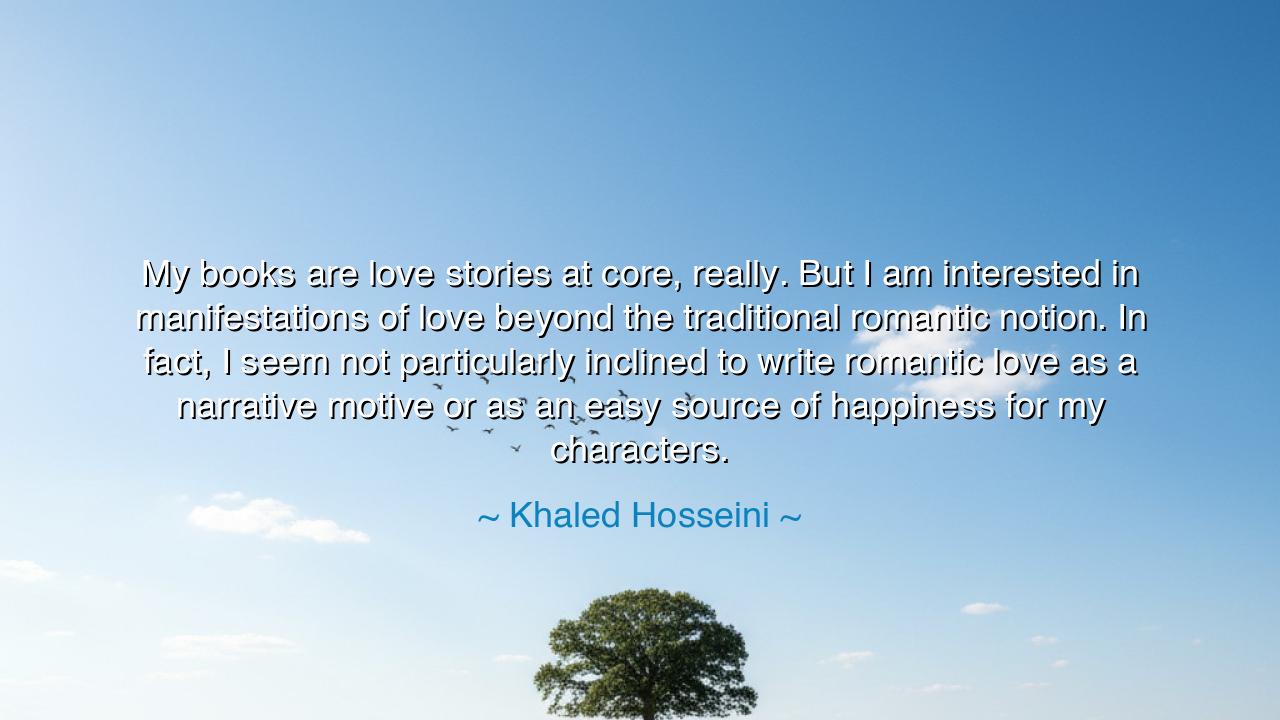
My books are love stories at core, really. But I am interested in
My books are love stories at core, really. But I am interested in manifestations of love beyond the traditional romantic notion. In fact, I seem not particularly inclined to write romantic love as a narrative motive or as an easy source of happiness for my characters.






The words of Khaled Hosseini—“My books are love stories at core, really. But I am interested in manifestations of love beyond the traditional romantic notion. In fact, I seem not particularly inclined to write romantic love as a narrative motive or as an easy source of happiness for my characters.”—reveal the depth of a storyteller who understands that love is a force far greater than courtship, desire, or marriage. He proclaims that his stories are indeed about love, but not in the narrow sense that the world often imagines. Instead, he seeks to uncover the many faces of love: the love of a parent for a child, of friends bound by loyalty, of neighbors and strangers whose destinies intertwine, and even the anguished love for a homeland lost to war and ruin.
At the heart of this statement lies the rejection of the “traditional romantic notion” of love. Hosseini refuses to present love as a convenient key to happiness or as a neatly tied ending. Instead, his characters often endure hardship, separation, betrayal, and sacrifice. For him, love is not a simple pleasure but a profound burden, a trial that tests the human soul. His vision is closer to the ancient poets and prophets, who saw love not merely as sweetness but as a transformative fire that purifies, humbles, and shapes destiny.
This vision is evident in his novels. In The Kite Runner, it is not romance that drives the story but the love between two boys, and the haunting guilt of betrayal that shadows that bond. In A Thousand Splendid Suns, love reveals itself in the resilience of women, in friendship that becomes sisterhood, and in sacrifice that transcends self-preservation. These are not tales of lovers walking into the sunset; they are sagas of how love in its many forms sustains the human heart in a world of cruelty and loss.
History gives us examples that illuminate this truth. Consider Antigone, in Sophocles’ tragedy, who risks her life not for a lover, but for her brother, insisting on giving him a burial that honors his dignity. Or recall Florence Nightingale, whose love was not for one man but for humanity itself, driving her to transform the horrors of war into acts of healing. These are stories where love is not romantic, yet it is heroic, sacrificial, and deeply human. Hosseini walks in this same lineage, showing that the greatest acts of love often dwell outside the narrow bounds of romance.
The meaning of Hosseini’s confession is thus: love is not always gentle or easy. It is not always about happiness or fulfillment. True love often involves pain, endurance, and the courage to place another’s well-being above one’s own. By refusing to make romantic love the easy solution in his stories, Hosseini teaches that the truest love may be that which costs us something—that which scars us, yet redeems us at the same time.
The lesson for us is powerful: expand your understanding of love. Do not confine it to the flutter of attraction or the sweetness of romance. Recognize love in sacrifice, in loyalty, in the small daily acts of care. See love in the parent who toils for their child, in the friend who stands by in silence during grief, in the stranger who offers kindness without expectation. These are the loves that endure, that define character, that echo long after passion has faded.
Practically, this means living with eyes open to the many manifestations of love. Cherish your romantic bonds, but also honor your friendships, your family ties, and your responsibilities to the world around you. Ask yourself not only, Who do I desire? but Whom do I serve? Whom do I protect? Whom do I forgive? For in these answers lies the broader, truer vision of love.
Thus, Khaled Hosseini’s words stand as both testimony and teaching. His books are love stories, but love seen in its highest and hardest forms. He reminds us that love is not always happiness, but it is always meaning. And those who dare to embrace love in all its manifestations—joyful or painful—will discover that even in suffering, the human heart is most alive when it loves.






AAdministratorAdministrator
Welcome, honored guests. Please leave a comment, we will respond soon